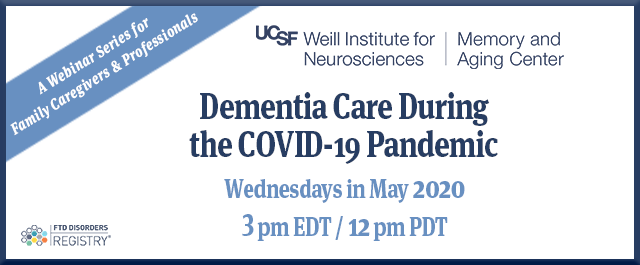PRESS & NEWS
UCSF Family Caregiver Webinar Series – May 2020

Coping with Dementia Care During the Coronavirus Pandemic
Coping with Dementia Care During the Coronavirus Pandemic
The University of California, San Francisco’s (UCSF) Memory and Aging Center (MAC) is extending its Family Caregiver Webinar Series through May 2020 to help caregivers cope during the COVID-19 pandemic. The webinars are offered weekly on Wednesdays in May from noon to 1 p.m. (PDT) via Zoom.
These webinars are intended to provide education and support to family caregivers impacted by the coronavirus and the professionals who support them. One CE credit available for RNs, LCSWs, MFTs, LPCCs, LEPs, and attorneys (see details below).
The sessions are facilitated by members of the MAC Behavior Task Force in partnership with family caregivers and the Institute on Aging. The format is a 45-minutes presentation followed by a Q&A session where questions from participants will be answered.
Sessions will be recorded and made available on the MAC COVID-19 page and YouTube channel under the Patient Care and Caregiving playlist.
There is also a Family Caregiver Webinar Series for Chinese Speakers. You can find this schedule at the bottom of the UCSF COVID-19 webpage.
The seminar schedule is listed below with its link to register. After each presentation, the resources and video will be added.
PREPARING FOR A POTENTIAL COVID-19 INFECTION: WHAT ARE THE ODDS AND WHAT ARE THE OPTIONS? - MAY 6, 2020
COLLECTIVELY GRIEVING THE WORLD AS WE KNEW IT - MAY 13, 2020
MAINTAINING MEDICATION SAFETY AT A DISTANCE - MAY 20, 2020
MANAGING DEMENTIA-RELATED BEHAVIORS WHILE SHELTERING IN PLACE - MAY 27, 2020
PREPARING FOR A POTENTIAL COVID-19 INFECTION: WHAT ARE THE ODDS AND WHAT ARE THE OPTIONS? - MAY 6, 2020
Family Caregiver Webinar presented by Ashwin Kotwal, M.D., UCSF Geriatrics and Palliative Care
WEBINAR SUMMARY
Objectives:
- Identify at least three ways in which COVID-19 has impacted older adults in the Bay Area, including individuals living in care facilities
- Outline at least two options for medical care and support in the event of a COVID-19 diagnosis
- Apply tips for important conversations, documentation, and preparation, in case you or a family member are diagnosed with COVID-19 or have to prepare for a hospital stay.
WEBINAR RESOURCES
Slide Presentation (PDF). This document can be read online or printed.
COLLECTIVELY GRIEVING THE WORLD AS WE KNEW IT - MAY 13, 2020
Family Caregiver Webinar presented by Patrick Arbore, Ed.D., Institute on Aging
WEBINAR SUMMARY
Objectives:
- Briefly describe how trauma, grief, and loss have been on the rise during this pandemic
- Explain how anxiety, stress, substance abuse and suicidal ideation have been exacerbated by the pandemic
- Discuss ways in which cultural and/or spiritual beliefs can be recognized as tools for comfort
- Apply three communication strategies for supporting someone who is suffering significant loss
WEBINAR RESOURCES
Slide Presentation (PDF). This document can be read online or printed.
References & Resources (PDF). This document can be read online or printed.
MAINTAINING MEDICATION SAFETY AT A DISTANCE - MAY 20, 2020
Family Caregiver Webinar presented by Lisa Morse, RN, CNRN, and Amy Liu, Pharm.D., from the UCSF Memory and Aging Center
WEBINAR SUMMARY
Objectives:
- Describe at least three potential medication safety concerns that may arise for family caregivers during shelter in place
- Identify medication access and organization options to make it easier for caregivers to manage medications from a distance
- Discuss medication administration strategies for individuals with cognitive impairment
WEBINAR RESOURCES
Slide Presentation (PDF). This document can be read online or printed.
References & Resources (PDF). This document can be read online or printed.
MANAGING DEMENTIA-RELATED BEHAVIORS WHILE SHELTERING IN PLACE - MAY 27, 2020
Family Caregiver Webinar presented by Jennifer Merrilees, RN, Ph.D., and Mary De May, M.D., from the UCSF Memory and Aging Center.
WEBINAR SUMMARY
Objectives:
- Describe the impact of dementia on changes in personality and behavior
- Explore non-pharmacological and pharmacological strategies for managing behaviors such as agitation, resistance to care, delusions and wandering while sheltering in place
- Identify at least three community resources that can be helpful to caregivers dealing with challenging behavior symptoms
WEBINAR RESOURCES
Slide Presentation (PDF). This document can be read online or printed.
References & Resources (PDF). This document can be read online or printed.
Together we can find a cure for ftd
The FTD Disorders Registry is a powerful tool in the movement to create therapies and find a cure. Together we can help change the course of the disease and put an end to FTD.
Your privacy is important! We promise to protect it. We will not share your contact information.



